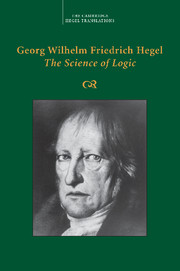Chapter 2 - Judgment
Published online by Cambridge University Press: 30 September 2021
Summary
Judgment is the determinateness of the concept posited in the concept itself. The determinations of the concept, or, what amounts to the same thing as shown, the determinate concepts, have already been considered on their own; but this consideration was rather a subjective reflection or a subjective abstraction. But the concept is itself this act of abstracting; the positioning of its determinations over against each other is its own determining. Judgment is this positing of the determinate concepts through the concept itself.
Judging is therefore another function than conceiving; or rather, it is the other function of the concept, for it is the determining of the concept through itself. The further progress of judgment into a diversity of judgments is this progressive determination of the concept. What kind of determinate concepts there are, and how they prove to be necessary determinations of it – this has to be exhibited in judgment.
Judgment can therefore be called the first realization of the concept, for reality denotes in general the entry into existence as determinate being. More precisely, the nature of this realization has presented itself in such a way that the moments of the concept are totalities which, on the one hand, subsist on their own through the concept's immanent reflection or through its singularity; on the other hand, however, the unity of the concept is their connection. The immanently reflected determinations are determinate totalities that exist just as essentially disconnected, indifferent to each other, as mediated through each other. The determining itself is a totality only as containing these totalities and their connections. This totality is the judgment. – The latter contains, therefore, the two self-subsistents which go under the name of subject and predicate.What each is cannot yet be said; they are still indeterminate, for they are to be determined only through the judgment. Inasmuch as judgment is the concept as determinate, the only determination at hand is the difference that it contains between determinate and still indeterminate concept. As contrasted to the predicate, the subject can at first be taken, therefore, as the singular over against the universal, or also as the particular over against the universal, or the singular over against the particular; so far, they stand to each other only as the more determinate and the more universal in general.
- Type
- Chapter
- Information
- Georg Wilhelm Friedrich Hegel: The Science of Logic , pp. 550 - 587Publisher: Cambridge University PressPrint publication year: 2010

